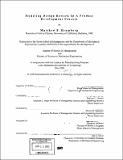| dc.contributor.advisor | Stephen C. Graves and Steven D. Eppinger. | en_US |
| dc.contributor.author | Bromberg, Matthew F. (Matthew Fox), 1970- | en_US |
| dc.contributor.other | Leaders for Manufacturing Program. | en_US |
| dc.date.accessioned | 2006-11-08T16:24:09Z | |
| dc.date.available | 2006-11-08T16:24:09Z | |
| dc.date.copyright | 2000 | en_US |
| dc.date.issued | 2000 | en_US |
| dc.identifier.uri | http://hdl.handle.net/1721.1/34712 | |
| dc.description | Thesis (M.B.A.)--Massachusetts Institute of Technology, Sloan School of Management; and, (S.M.)--Massachusetts Institute of Technology, Dept. of Mechanical Engineering; in conjunction with the Leaders for Manufacturing Program, Massachusetts Institute of Technology, 2000. | en_US |
| dc.description | Includes bibliographical references (p. 37-38). | en_US |
| dc.description.abstract | Managing the product development process is of vital concern to corporations. A critical aspect of product development that negatively impacts program cost and timing is rework. Unfortunately, in large organizations with successive development cycles, the product, process and organizational complexity preclude simple solutions. Even given sufficient data, many organizations do not understand what constitutes good and bad performance relative to rework. Through research at General Motors Truck Product Group, a model was developed that forecasts expected total rework. The model assumes rework is a function of: 1) The product portfolio and timing; 2) The complexity of each product program; 3) The pattern of rework over time for product programs; 4) The "lifecycle age" of each product program. The model has four potential uses: A) To aid in portfolio/project planning; B) To provide a rework performance baseline for management; C) To evaluate initiatives with regards to their impact on design rework; D) To identify leverage targets for management attention and improvement. | en_US |
| dc.description.statementofresponsibility | by Matthew F. Bromberg. | en_US |
| dc.format.extent | 44 p. | en_US |
| dc.format.extent | 3195163 bytes | |
| dc.format.extent | 3194919 bytes | |
| dc.format.mimetype | application/pdf | |
| dc.format.mimetype | application/pdf | |
| dc.language.iso | eng | en_US |
| dc.publisher | Massachusetts Institute of Technology | en_US |
| dc.rights | M.I.T. theses are protected by copyright. They may be viewed from this source for any purpose, but reproduction or distribution in any format is prohibited without written permission. See provided URL for inquiries about permission. | en_US |
| dc.rights.uri | http://dspace.mit.edu/handle/1721.1/7582 | |
| dc.subject | Sloan School of Management. | en_US |
| dc.subject | Mechanical Engineering. | en_US |
| dc.subject | Leaders for Manufacturing Program. | en_US |
| dc.title | Modeling design rework in a product development process | en_US |
| dc.type | Thesis | en_US |
| dc.description.degree | S.M. | en_US |
| dc.description.degree | M.B.A. | en_US |
| dc.contributor.department | Leaders for Manufacturing Program at MIT | en_US |
| dc.contributor.department | Massachusetts Institute of Technology. Department of Mechanical Engineering | |
| dc.contributor.department | Sloan School of Management | |
| dc.identifier.oclc | 45577843 | en_US |
